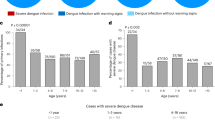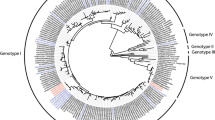Abstract
Japanese encephalitis (JE) virus and dengue virus are closely related flaviviruses but interaction between them is scarcely studied in humans. The objective of this study was to compare the outcome of JE patients who are positive and negative for dengue IgG antibodies. Patients of acute encephalitis syndrome (AES) fulfilling predecided inclusion and exclusion criteria underwent a detailed standardized workup incorporating JE IgM testing in cerebrospinal fluid (CSF) or serum. Dengue IgG in serum was tested in all. Outcomes and clinical features were compared between JE patients who were dengue IgG positive and negative in hospital and after 3 months. A total of 182 patients of JE were enrolled over 3 seasons. After excluding equivocal cases, hospital outcome was compared between 105 dengue IgG-positive and 50 dengue IgG-negative patients. Dengue IgG-positive patients had a significantly better outcome (relative risk 1.4; 95% confidence interval 1.1–1.8). On follow-up after 3 months, again, outcome was significantly better among 95 dengue IgG-positive patient than 47 dengue IgG-negative patients (relative risk 1.3; 95% confidence interval 1.01–1.8). Presence of pre-existing dengue IgG antibodies in JE patients is associated with improved outcomes.

Similar content being viewed by others
References
Price WH, Thind IS (1971) Protection against West Nile virus induced by a previous injection with dengue virus. Am J Epidemiol 94:596–606
Price WH, Thind IS, O’Leary W, El Dadah AH (1967) A protective mechanism induced by live group B arboviruses against heterologous group B arboviruses independent of serum neutralizing antibodies or interferon. Am J Epidemiol 86:11–27
Sather GE, Hammon MW (1970) Protection against St. Louis encephalitis and West Nile arboviruses by previous dengue virus (types 1-4) infection. Proceedings Society Experimental Biology Medicine 135:573–578
Li J, Gao N, Fan D, Chen H, Sheng Z, Fu S, Liang G et al (2016) Cross-protection induced by Japanese encephalitis vaccines against different genotypes of dengue viruses in mice. Sci Rep 6:19953. https://doi.org/10.1038/srep19953
Tarr GC, Hammon WM (1974) Cross-protection between group B arboviruses: resistance in mice to Japanese B encephalitis and St. Louis encephalitis viruses induced by dengue virus immunization. Infect Immun 9:909–915
Libraty DH, Nisalak A, Endy TP, Suntayakorn S, Vaughn DW, Innis BL (2002) Clinical and immunological risk factors for severe disease in Japanese encephalitis. Transactions Royal Society Tropical Medicine Hygeine 96:173–178
Halstead SB, O’Rourke EJ (1977) Antibody-enhanced dengue virus infection in primate leukocytes. Nature 265:739–741
Halstead SB, Porterfield JS, O’Rourke EJ (1980) Enhancement of dengue virus infection in monocytes by flavivirus antisera. Am J Tropical Medicine Hygeine 29:638–642
Halstead SB, Nimmannitya S, Cohen SN (1970) Observations related to pathogenesis of dengue hemorrhagic fever. IV Relation Disease Severity Antibody Response Virus Recovered Yale J Biology Medicine 42:311–328
Anderson KB, Gibbons RV (2011) Thomas SJ, et al preexisting Japanese encephalitis virus neutralizing antibodies and increased symptomatic dengue illness in a school-based cohort in Thailand. PLoS Neglected Tropical Disease 5:e1311
Sato R, Hamada N, Kashiwagi T, Imamura Y, Hara K, Naito Y et al (2015) Dengue hemorrhagic fever in a Japanese traveler who had preexisting Japanese encephalitis virus antibody. Tropical Medicine Health 43:85–88
http://upnrhm.gov.in/site-files/dhap/districts Accessed 22nd July 2017
Gadkari DA, Shaikh BH (1984) IgM antibody capture ELISA in the diagnosis of Japanese encephalitis, West Nile & dengue virus infections. Indian J Med Res 80:613–619
Jennett B, Bond M (1975) Assessment of outcome after severe brain damage. Lancet 1(7905):480–484
Nuegoonpipat A-A, Panthuyosri N, Anantapreecha S, Chanama S, Sa-Ngasang A, Sawanpanyalert P, Kurane I (2008) Cross-reactive IgM responses in patients with dengue or Japanese encephalitis. J Clin Virol 42:75–77
Pipattanaboon C, Sasaki T, Nishimura M, Setthapramote C, Pitaksajjakul P, Leaungwutiwong P et al (2013) Cross-reactivity of human monoclonal antibodies generated with peripheral blood lymphocytes from dengue patients with Japanese encephalitis virus. Biologics 7:175–187
Saito Y, Moi ML, Takeshita N, Lim KC, Shiba H, Hosono K, Saijo M, Kurane I, Takasaki T (2016) Japanese encephalitis vaccine-facilitated dengue virus infection-enhancement antibody in adults. BMC Infect Dis 16:578
Pierson TC, Kielian M (2013) Flaviviruses: braking the entering. Current Opinion in Virology 3:3–12
Stiasny K, Kiermayr S, Holzmann H, Heinz FX (2006) Cryptic properties of a cluster of dominant flavivirus cross-reactive antigenic sites. J Virol 80:9557–9568
Oliphant T et al (2007) Induction of epitope-specific neutralizing antibodies against West Nile virus. J Virol 81:11828–11839
Crill WD, Trainor NB, Chang GJ (2007) A detailed mutagenesis study of flavivirus cross-reactive epitopes using West Nile virus-like particles. J Gen Virol 88:1169–1174
Trainor NB, Crill WD, Roberson JA, Chang GJ (2007) Mutation analysis of the fusion domain region of St. Louis encephalitis virus envelope protein. Virology 360:398–406
Lai CY et al (2008) Antibodies to envelope glycoprotein of dengue virus during the natural course of infection are predominantly cross reactive and recognize epitopes containing highly conserved residues at the fusion loop of domain II. J Virol 82:6631–6643
Dejnirattisai W et al (2010) Cross-reacting antibodies enhance dengue virus infection in humans. Science 328:745–748
Funding
This study was funded by the Indian Council of Medical Research.
Author information
Authors and Affiliations
Corresponding author
Ethics declarations
Conflict of interest
The authors declare that they have no conflict of interest.
Ethical approval
Ethical approval was from the Institutional Ethics Committee, King George’s Medical University.
Informed consent
A written informed consent was taken.
Rights and permissions
About this article
Cite this article
Verma, A., Jain, A., Kumar, C. et al. Effect of prior dengue infection on severity and outcome of Japanese encephalitis. Eur J Clin Microbiol Infect Dis 37, 519–525 (2018). https://doi.org/10.1007/s10096-018-3207-9
Received:
Accepted:
Published:
Issue Date:
DOI: https://doi.org/10.1007/s10096-018-3207-9




